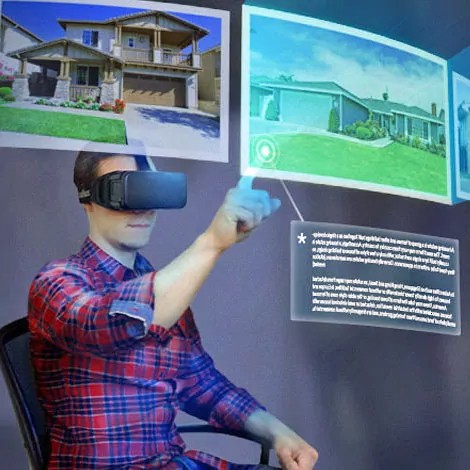How to Make Money Online as a Virtual Real Estate Agent
In this article, we will explore the steps to becoming a successful virtual real estate agent and how to maximize your earnings in this field.
The digital era has transformed various industries, including real estate. Virtual real estate agents have emerged as key players in this evolving landscape. As a virtual real estate agent, you have the opportunity to work remotely and capitalize on the digital tools and platforms available to reach a broader audience.
A virtual real estate agent is responsible for facilitating property transactions online. This includes tasks such as marketing properties, conducting virtual tours, communicating with clients, and negotiating deals. It is essential to have a comprehensive understanding of the real estate market, local regulations, and effective online marketing strategies.
To succeed as a virtual real estate agent, establishing a strong online presence is crucial. Create a professional website and optimize it for search engines. Showcase your expertise, listings, and testimonials to build trust with potential clients. Additionally, leverage social media platforms to connect with a wider audience and share valuable content related to the real estate industry.
Digital marketing is a powerful tool for virtual real estate agents. Utilize search engine optimization (SEO) techniques to improve the visibility of your website and attract organic traffic. Engage in content marketing by writing informative blog posts, creating videos, or hosting webinars that address common questions and concerns of potential clients. Leverage email marketing campaigns and paid advertising to further promote your services.
Networking plays a vital role in the real estate industry. Connect with other professionals, such as mortgage brokers, home inspectors, and property managers. Join industry associations and attend virtual conferences and events. Building a strong network will not only lead to potential referrals but also provide valuable insights and support throughout your career.
Collaboration with industry professionals can enhance your credibility and expand your reach. Partner with reputable real estate agencies or brokers who specialize in virtual transactions. By collaborating, you can tap into their established networks and access a wider range of properties for your clients.
Virtual reality (VR) and 3D tours have revolutionized the way properties are showcased online. Invest in VR technology and create immersive virtual tours for your listings. This allows potential buyers to explore properties from the comfort of their homes, increasing their engagement and interest.
Delivering exceptional customer service is paramount in the virtual real estate business. Be responsive to inquiries, provide timely updates, and offer personalized advice. Utilize video conferencing tools to conduct virtual meetings and offer virtual consultations. Going the extra mile to meet your client's needs will set you apart from the competition.
Lead generation is a critical aspect of being a virtual real estate agent. Implement strategies such as creating targeted landing pages, offering free resources or guides, and hosting virtual open houses. Use lead management software to track and nurture leads, ensuring a higher conversion rate and maximizing your sales potential.
As a virtual real estate agent, your earnings are directly linked to your performance. Continuously refine your marketing strategies, invest in professional development, and expand your client base. Consider offering additional services such as property management or real estate investment consultations to increase your revenue streams.
Working as a virtual real estate agent comes with its challenges. Common obstacles include building trust with clients who may be hesitant to make online transactions, managing time effectively while working remotely, and staying up to date with the latest technological advancements. By addressing these challenges proactively and continuously adapting, you can overcome them and thrive in the virtual real estate industry.
The real estate industry is ever-evolving, and staying updated is crucial for success. Engage in continuous learning through online courses, webinars, and industry publications. Stay informed about market trends, changes in regulations, and emerging technologies. By expanding your knowledge and skills, you can remain competitive and provide valuable insights to your clients.
Table of Contents
- Introduction
- Understanding the Role of a Virtual Real Estate Agent
- Building Your Online Presence
- Utilizing Digital Marketing Strategies
- Developing a Strong Network
- Collaborating with Industry Professionals
- Leveraging Virtual Reality and 3D Tours
- Providing Exceptional Customer Service
- Generating Leads and Converting Sales
- Maximizing Your Earnings
- Overcoming Challenges
- Continuous Learning and Professional Development
- Conclusion
- FAQs
- Introduction
The digital era has transformed various industries, including real estate. Virtual real estate agents have emerged as key players in this evolving landscape. As a virtual real estate agent, you have the opportunity to work remotely and capitalize on the digital tools and platforms available to reach a broader audience.
- Understanding the Role of a Virtual Real Estate Agent
A virtual real estate agent is responsible for facilitating property transactions online. This includes tasks such as marketing properties, conducting virtual tours, communicating with clients, and negotiating deals. It is essential to have a comprehensive understanding of the real estate market, local regulations, and effective online marketing strategies.
- Building Your Online Presence
To succeed as a virtual real estate agent, establishing a strong online presence is crucial. Create a professional website and optimize it for search engines. Showcase your expertise, listings, and testimonials to build trust with potential clients. Additionally, leverage social media platforms to connect with a wider audience and share valuable content related to the real estate industry.
- Utilizing Digital Marketing Strategies
Digital marketing is a powerful tool for virtual real estate agents. Utilize search engine optimization (SEO) techniques to improve the visibility of your website and attract organic traffic. Engage in content marketing by writing informative blog posts, creating videos, or hosting webinars that address common questions and concerns of potential clients. Leverage email marketing campaigns and paid advertising to further promote your services.
- Developing a Strong Network
Networking plays a vital role in the real estate industry. Connect with other professionals, such as mortgage brokers, home inspectors, and property managers. Join industry associations and attend virtual conferences and events. Building a strong network will not only lead to potential referrals but also provide valuable insights and support throughout your career.
- Collaborating with Industry Professionals
Collaboration with industry professionals can enhance your credibility and expand your reach. Partner with reputable real estate agencies or brokers who specialize in virtual transactions. By collaborating, you can tap into their established networks and access a wider range of properties for your clients.
- Leveraging Virtual Reality and 3D Tours
Virtual reality (VR) and 3D tours have revolutionized the way properties are showcased online. Invest in VR technology and create immersive virtual tours for your listings. This allows potential buyers to explore properties from the comfort of their homes, increasing their engagement and interest.
- Providing Exceptional Customer Service
Delivering exceptional customer service is paramount in the virtual real estate business. Be responsive to inquiries, provide timely updates, and offer personalized advice. Utilize video conferencing tools to conduct virtual meetings and offer virtual consultations. Going the extra mile to meet your client's needs will set you apart from the competition.
- Generating Leads and Converting Sales
Lead generation is a critical aspect of being a virtual real estate agent. Implement strategies such as creating targeted landing pages, offering free resources or guides, and hosting virtual open houses. Use lead management software to track and nurture leads, ensuring a higher conversion rate and maximizing your sales potential.
- Maximizing Your Earnings
As a virtual real estate agent, your earnings are directly linked to your performance. Continuously refine your marketing strategies, invest in professional development, and expand your client base. Consider offering additional services such as property management or real estate investment consultations to increase your revenue streams.
- Overcoming Challenges
Working as a virtual real estate agent comes with its challenges. Common obstacles include building trust with clients who may be hesitant to make online transactions, managing time effectively while working remotely, and staying up to date with the latest technological advancements. By addressing these challenges proactively and continuously adapting, you can overcome them and thrive in the virtual real estate industry.
- Continuous Learning and Professional Development
The real estate industry is ever-evolving, and staying updated is crucial for success. Engage in continuous learning through online courses, webinars, and industry publications. Stay informed about market trends, changes in regulations, and emerging technologies. By expanding your knowledge and skills, you can remain competitive and provide valuable insights to your clients.
- Conclusion
- FAQs
- -What qualifications do I need to become a virtual real estate agent?
- -How do I market my services as a virtual real estate agent?
- -Is it possible to build a successful career as a virtual real estate agent?
- -What are the advantages of using virtual reality and 3D tours in real estate?
- -How can I overcome the challenges of building trust with online clients?



